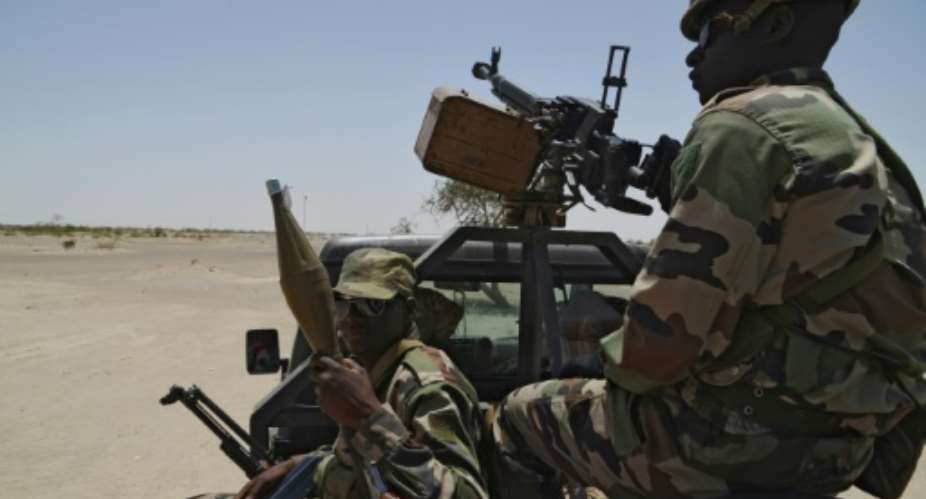N'Djamena (AFP) - Chad's parliament was to vote Thursday on a controversial anti-terror bill after a string of deadly Boko Haram attacks, raising fears among opponents and rights activists that the law may be used to curtail freedoms.
After suffering two suicide bombings in a month, including one in a bustling market in the capital N'Djamena, Chad has beefed up security in recent weeks.
It has already banned the wearing of the full Islamic veil, and on Thursday local authorities in the capital imposed a ban on begging.
Chad has helped spearhead a major regional offensive launched in early 2015 to fight the Nigerian militants, and N'Djamena is now set to host the headquarters of a new, more efficient multinational task force created in the face of a fresh surge of attacks.
The draft anti-terror bill has already been approved by Chad's government, and now needs parliament's approval to become law.
By Thursday evening, despite hours of debate, lawmakers had yet to come to a decision.
The law's vague definition of "terrorism" has raised concerns among the country's opposition and activists, who fear it could be used too sparingly.
It also extends the pre-charge detention period to 15 days, renewable twice.
The bill targets authors of both criminal attacks and acts that inhibit "the proper functioning of public services."
This definition "opens civil society organisations and political parties to repression under the cover of (fighting) terrorism," three Chadian unions said in a joint statement.
"When pensioners occupy the streets... to demand their pensions, they risk being branded terrorists. Even a simple speech can be seen as an apology for terrorism," opposition MP and leader Saleh Kebzabo said.
"No one wants terrorism," Kebzabo said, adding that the fight against Boko Haram has come as a "windfall to the Chadian government" and "allows for the organisation of repression before the presidential vote" slated for next year.
- Ban on bars, full veils -
Chad has taken steps to increase security since suicide attacks struck a school and a police building in N'Djamena in June, killing 38 people, and again in July, killing 15 in a market.
On Thursday, authorities in N'Djamena banned begging in the capital a week after two girls who were begging blew themselves up in neighbouring Cameroon.
The full Islamic veil has also been banned after several people wearing the garment carried out suicide attacks in Chad and neighbouring countries.
In a country where Muslims make up 53 percent of the population -- with Christians accounting for 35 percent -- the ban on the veil, including the face-covering burqa, prompted mixed reactions.
The tough prohibition was a first in Africa, but several regions of Cameroon and Niger have since followed suit.
On Thursday, N'Djamena mayor Ali Haroun also ordered bars to shut at 10:00 pm, except on Saturdays and on the eve of public holidays, when they are allowed to stay open until midnight.
In Cameroon, a 12-year-old girl suicide bomber killed 20 people last Saturday night in an attack on a bar in Maroua, which is situated southwest of the border from N'Djamena.
Raids and arrests by the security forces have shot up in recent months, with reports of hundreds of people detained in N'Djamena alone.
Amnesty International has condemned the "total impunity" in which serious rights violations take place in Chad.
"Human rights defenders, journalists and trade unionists were victims of harassment, intimidation, arbitrary arrest and detention," the London-based rights group said in its annual report for 2014-2015.





 Chief arrested for killing soldier at Kasoa over land
Chief arrested for killing soldier at Kasoa over land
 GAF probes soldier’s murder at Kasoa Millenium City
GAF probes soldier’s murder at Kasoa Millenium City
 Ghana steps up effort to pass new Labour law
Ghana steps up effort to pass new Labour law
 AG advises EOCO against money laundering probe into Cecilia Abena Dapaah’s affai...
AG advises EOCO against money laundering probe into Cecilia Abena Dapaah’s affai...
 May Day: I'll prioritise welfare of workers, abolish compulsory retirement age a...
May Day: I'll prioritise welfare of workers, abolish compulsory retirement age a...
 V/R: Adaklu-Tevikpo murder suspect arrested from hideout
V/R: Adaklu-Tevikpo murder suspect arrested from hideout
 Kasoa: Soldier killed by alleged land guards over land dispute — GAF
Kasoa: Soldier killed by alleged land guards over land dispute — GAF
 Fatal shooting of soldier happened at Gomoa East not Kasoa; stop tarnishing our ...
Fatal shooting of soldier happened at Gomoa East not Kasoa; stop tarnishing our ...
 ‘We condemn unprovoked attack in no uncertain terms’ — GAF on fatal shooting of ...
‘We condemn unprovoked attack in no uncertain terms’ — GAF on fatal shooting of ...
 Ghanaians urged to ensure violence free elections on December 7
Ghanaians urged to ensure violence free elections on December 7
